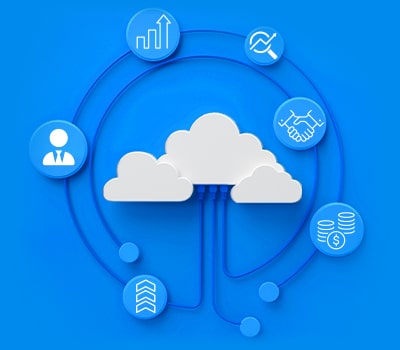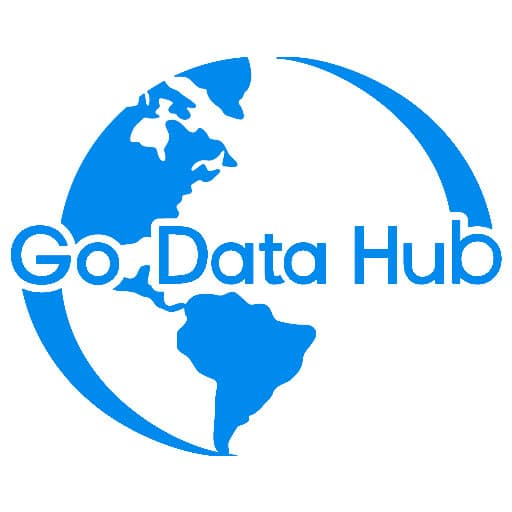Is a Cloud-based Custom CRM Solution Right For You?

What is a Custom CRM Solution and How Does Cloud Hosting Fit In?
CRM stands for Customer Relationship Management. It’s essentially a powerhouse for storing and managing your customer data, tracking interactions, and improving sales and services. Businesses thrive on relationships, so a CRM is like your virtual relationship guru – it helps you know your customers, remember important details, and stay connected effectively.
Now, every business is different, so how do you find a CRM that fits like a glove? Simple, you opt for a custom CRM solution. Unlike one-size-fits-all, off-the-shelf CRM software, custom CRMs are tailored to your business’s unique processes and quirks. They’re the haute couture of CRMs, ensuring no feature is redundant and every functionality adds value to your business. When looking for custom CRM software development you’ll need a company like GoDataHub that can create and manage your custom solution.
Let’s talk cloud hosting. Imagine having your CRM not tied down to an office server, accessible from anywhere, at any time—it’s like having the freedom to manage customer relationships poolside, if that’s your thing. That’s what cloud hosting is all about. Integrating your CRM with the cloud means all your data is stored on remote servers, offering scalability, lower costs, and seamless updates. Your custom CRM becomes a part of a vast network, where it’s maintained, without you worrying about the nitty-gritty of server management.
Table of contents:
- What is a Custom CRM Solution and How Does Cloud Hosting Fit In?
- Why Choose a Cloud-Based Custom CRM for Your Business?
- How Cloud-Based CRM Solutions Can Improve Customer Experiences
- Security Considerations Should You Weigh When Using a Cloud-Based CRM
- How Moving to a Cloud-Based CRM Impacts Team Collaboration
- Challenges of Implementing a Cloud-Based Custom CRM
- Where to Find Reliable Cloud-Based CRM Service Providers and How to Choose One
Why Choose a Cloud-Based Custom CRM for Your Business?
Custom CRM development for business can take your workflow for zero to hero. This is because it cuts out inefficiencies and other productivity killers which leads to an increase in your bottom line. If you’re looking to optimize your business then GoDataHub’s custom CRM software development might be right for you.
Next up, we’re talking anytime, anywhere access. The office is wherever you are—the café, your living room, even mid-flight. All you need is a device and the internet to reach into your business cloud. Customers’ data, sales statistics, marketing campaigns, wall-to-wall at your fingertips. It’s essentially work life on-the-go, without lugging around the extra weight. Flexibility is king in the modern business savannah, and with cloud CRM, you’re the reigning monarch.
Last but not least, scalability is the secret sauce of cloud-based CRMs. Start small, dream big, and scale fast. As your business balloons, your CRM stretches with you, no growing pains necessary. It’s about right-sizing—no paying for unused features or scrambling during busy seasons. These systems evolve with your business, effortlessly aligning with changes in size, strategy, and scope. Cloud CRM solutions are not just about meeting your current needs—they’re about future-proofing your business growth.
How Cloud-Based CRM Solutions Can Improve Customer Experiences
Imagine having the latest customer data at your fingertips, anytime, anywhere. That’s what cloud-based CRM offers – real-time data access and updates. With instant information, customer service reps can provide accurate, informed support without skipping a beat. No more “let me update the system and get back to you”; now it’s all about seamless, on-the-spot solutions.
Now, let’s talk about making it personal. A cloud CRM isn’t just a data repository; it’s a personalization powerhouse. Through sophisticated data analytics, every interaction with a customer can be tailored, creating experiences that are as individual as the customers themselves. This personalized approach not only boosts satisfaction but also fosters loyalty—and loyal customers are pure gold.
Finally, consistency is key in customer experiences. Cloud-based CRMs ace this by offering integration with other services and a consistent experience across multiple platforms. Whether it’s a phone call, an email, or a social media message, the information is unified. This interconnectedness means a seamless transition for customers, regardless of how or where they reach out.
- Instant access to data means more efficient customer service.
- Personalization through analytics enhances customer loyalty.
- Seamless integrations across platforms ensure uniformity in customer interactions.
Security Considerations Should You Weigh When Using a Cloud-Based CRM
Data is gold, and like gold, it attracts attention – not all of it welcome. When you’re looking into cloud-based CRM solutions, it’s critical to grasp the nuances of data security and compliance. The cloud may seem like an amorphous, secure-by-default space, but that’s not always the case. Compliance refers to how well your chosen CRM adheres to regulations like GDPR, HIPAA, or others, depending on your industry and location. It’s about keeping data safe not just from thieves and snoops but also from accidental breaches of law.
Ensuring data privacy and protection in your CRM isn’t just a preference; it’s a necessity. This includes encryption of data both at rest and in transit, meaning that your information should be scrambled into unreadable gibberish whenever it’s stored or sent until it reaches the intended party. Also, consider access controls like multi-factor authentication, which ensures that only vetted users can get inside the CRM. It’s a layered approach: if one defensive wall is breached, there are more to stop an intruder.
Let’s talk risks. A cloud-based CRM, while often more secure than its on-premises counterpart, still faces potential security risks. These include data breaches, account hijacking, and service traffic hijacking. However, top-notch cloud CRM providers bring their A-game to mitigate these risks. They use data centers with robust physical security, maintain up-to-date firewalls, and stay vigilant with constant security monitoring. They can also back up your data across multiple locations, safekeeping against natural disasters or server failures. Think of it like a highly secure bank vault, where your data is the currency.
- Review and understand the compliance measures that apply to your industry and region.
- Incorporate encryption and access control measures to protect data at all times.
- Choose providers with strong track records in mitigating common cloud security threats.
How Moving to a Cloud-Based CRM Impacts Team Collaboration
The shift to a cloud-based Customer Relationship Management (CRM) platform is like opening doors to a virtual workspace that’s accessible anytime, anywhere. This transformation lays the foundation for remote work and cross-departmental collaboration. With key information stored in the cloud, your sales, marketing, and support teams can unite under a single virtual roof, irrespective of physical locations. Seamless access equates to synchronized strategies and the ability to respond to customer needs with collective agility.
Integration of team communication tools within a cloud-based CRM turns the platform into a hub for interaction. Features like instant messaging, activity feeds, and document sharing become embedded in daily tasks, directly linking communication with client data. This synergy promotes an environment where every team member is tuned in to the latest updates, fostering a culture of open communication and real-time feedback, which are crucial for making informed decisions and driving business forward.
Furthermore, a cloud-based CRM doesn’t just facilitate team dynamics; it also provides robust tracking of productivity and contributions. CRM metrics enable managers to monitor deals closed, client issues resolved, and leads generated, offering clear insights into individual and team performance. By analyzing these metrics, organizations can identify top performers, uncover areas for improvement, and celebrate collective successes, thereby motivating teams and aligning efforts towards common goals.
Challenges of Implementing a Cloud-Based Custom CRM
Transitioning to a cloud-based custom CRM mixes excitement with challenge, primarily tech-speak that means ‘hiccups expected.’ Technical hurdles might pop up during migration. Think data formats that clash or integration snarls with legacy systems. Like getting an elephant on a trampoline, it requires strategy and careful execution to avoid a crash.
Employees may eye the new CRM with suspicion, their comfort with old systems deep-rooted. Change management isn’t just a buzzword; it’s about comprehensive training and support. Ensuring staff are up to speed with the new system is crucial, like swapping a bicycle for a motorcycle—you need to know where the brakes are.
Imagine the CRM as the heart of your business; any interruption is like a skipped beat. During the transition, you’re aiming for a seamless switchover, keeping data integrity and service continuity alive. This makes the challenge more akin to performing heart surgery while the patient is running a marathon. Meticulous planning and expert execution are a must to maintain a steady business pulse.
Where to Find Reliable Cloud-Based CRM Service Providers and How to Choose One
Selecting a cloud-based CRM provider? Focus on a few non-negotiables: scalability, security features, integration capabilities, and customization options. Weighing these criteria against cost will lead you to a balanced choice. Also, think about user-friendliness. After all, a tool’s only good if your team actually uses it.
SLAs are sacred. They’re the promises your provider swears to — uptime, data protection, and support response times. Read these agreements like your business depends on it (because it does). Poor customer support can spoil an otherwise perfect service, so grill potential providers about their help desks, response times, and problem-solving efficiency.
Don’t just trust what they say; verify it. Look for testimonials, ask for case studies. When a provider has proof of happy clients, especially ones with needs like yours, that’s a green light. Do your homework, check reviews, and always, always ask around. Choose a vendor not by what they promise, but by what they have delivered to others.

